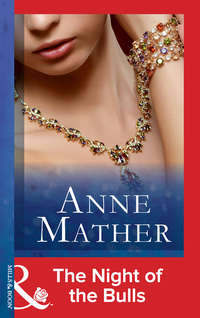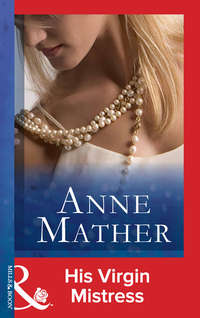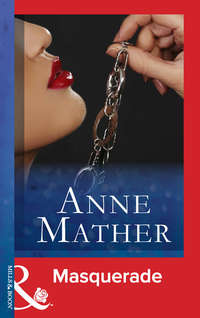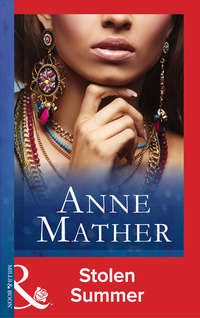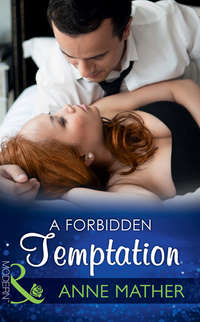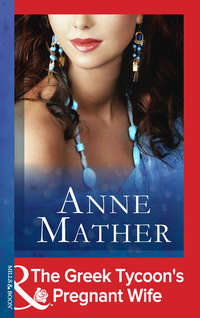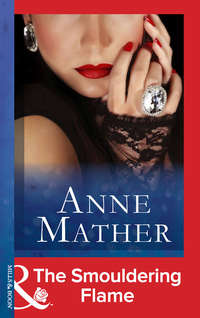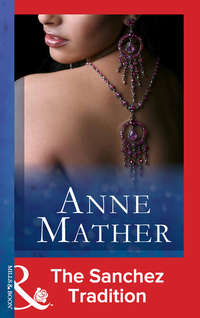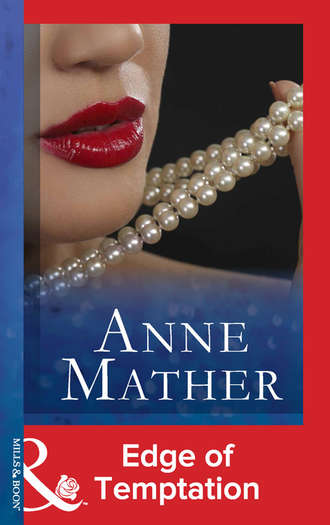
Полная версия
Edge Of Temptation
‘I think not.’ Rafe had no intention of being rude, but selling Penwyth was never on the cards. ‘Besides, you’re too generous, Sir George. No one in his right mind would want to buy this white elephant. Woodworm, dry rot, a leaking roof—you name it, we’ve got it. Penwyth needs a small fortune spending on it, and even then, of what use is a house as large as this to anyone?’
Marland’s eyes flickered. ‘It’s a show-piece, and you know it, Glyndower. Dry rot and all. With a few thousands invested, it could rival the stateliest homes in the country.’
‘You’re not suggesting I should put it into the hands of the National Trust, are you, Sir George?’ Rafe enquired shortly, and Lucy cast him an impatient look before hurrying into speech.
‘I’m afraid you’ve touched on rather a sore point with us, Sir George,’ she declared. ‘Penwyth is my husband’s one weakness; nothing and no one will induce him to leave this house voluntarily.’ She made an expressive gesture. ‘I can’t imagine why.’
‘Can’t you?’
The challenge was unexpected, and she gave her husband another disapproving stare before offering their guests another drink.
John Norman chose to intervene at this point, turning the conversation into less explosive channels, and for a while there was no contention between them. But Sir George was not a patient man, and soon he returned to the subject which had brought him to the valley.
‘You will let us have your decision soon, Glyndower,’ he remarked, making it more a statement than a question, and Rafe inclined his head. ‘You do realise there’s the possibility of a public enquiry if the scheme is mounted, and that could delay us even further?’
Rafe frowned. ‘A public inquiry?’
‘Of course.’ Marland sighed. ‘Norman, didn’t you explain all this?’
‘Until Mr Glyndower agrees to a test bore, I see no reason to anticipate the worst, Sir George.’
‘In my experience, it pays to anticipate the worst. Then one is never disappointed, Norman.’ Marland shook his head. ‘You do appreciate my position, Glyndower? I need a decision to take back to the Minister.’
‘And you shall have it. Tomorrow,’ Rafe assured him briefly, rising to his feet, decisively ending the meeting.
John Norman hastily finished his drink and rose, too, but Sir George was less enthusiastic. However, he had little choice in the matter, and Rafe saw Lucy’s pained expression as Marland offered her his thanks for their hospitality.
‘We hope to see you again, Sir George,’ she demurred, accompanying them to the door, but Rafe cast an impatient look upstairs as he put on his jacket once more. He had still to drive the two men back to the helicopter, and again, Tom would have to wait.
It was getting dark when he got back to the house. This time Rufus accompanied him indoors, bounding off towards the kitchen for his supper at his master’s command. Removing his jacket again, Rafe hesitated in the hall, torn between the desire to speak to Tom and the awareness of Lucy’s disapproval emanating from behind the closed door of the library.
Stifling a curse, he turned towards the library, throwing open the door and entering the room with little regard for its occupant. As expected, Lucy was still sitting beside the tray of tea, gazing throughtfully into the glowing embers of the fire. With her shoulders hunched, and her head turned away from him, she had a delicate air of helplessness, and his conscience stirring within him, he closed the door with more consideration. She did not stir, and on impulse he crossed the room towards her, and bent to bestow a light kiss on the curving nape of her neck.
‘Don’t touch me!’
Her harsh words froze the spark of emotion that had prompted his action. With a jack-knifing movement she put the length of the couch between them, to sit regarding him with angry, resentful eyes.
Rafe needed no reminder of the uselessness of appealing to Lucy in this mood. She could suppress her emotions without effort, so successfully, in fact, that at times he suspected they were as counterfeit as the fragile appearance she presented to the world. It was not in her nature to compromise, and right now, she was in danger of losing everything she had worked for.
Pulling the case of cheroots out of his pocket, Rafe ignored the sound of distaste she made, and bent to light his cigar with a taper from the fire. Then, straightening, he said: ‘I might as well go and speak to Tom, if you’ve got nothing to say.’
It was the match to the dynamite and as he had expected, Lucy exploded: ‘Is that all you can think about? Your precious son! When there are matters of supreme importance to discuss, all you can think about is that disobedient little horror upstairs!’
Rafe inhaled deeply. ‘He’s your son, too,’ he pointed out mildly, refusing to be aroused by Lucy’s vituperation. It was a deliberate attempt, he knew, to incite his anger, and in so doing, weaken his arguments against Norcroft. In the heat of the moment, he was apt to say things he would later regret, and Lucy never let him forget anything.
‘You don’t care about anyone but yourself!’
This was another favourite accusation of hers. It wasn’t true. He did care. He cared deeply for the people in the valley, the people he had known since he was a boy himself. He cared about Penwyth, and he knew that if ever his father had to move from the house, it would kill him. He cared about Tom—and Lucy, although his feelings for her had changed from the boyish infatuation she had first inspired to a kind of patient toleration. She was his wife, the mother of his son. He could admire her. He freely admitted that she was a better business person than he was. But there were times, as now, when her determination and self-interest, her ambition, appalled him, and he refused to be browbeaten into accepting a situation just to sustain her good humour.
‘If that’s what you think, I shall go and speak to Tom,’ he said now, moving towards the door, and she sprang to her feet, fists clenched in frustration.
‘Rafe!’ She was obviously fighting the desire to rant at him. ‘Rafe, listen to me. This is our chance, our opportunity; the only opportunity we’re ever likely to have. All right, so I know I’ve got no love for this place, but that doesn’t mean I wouldn’t like to see it restored to what it was. Just think what we could do! That dampness in your study—the roof—–’
‘Do you think I don’t know that?’ Rafe’s lips tightened. ‘We need the money—I’m not denying it. But … I don’t know …’
‘Rafe, Rafe …’ She sensed his weakening, and came to stand near him. ‘I know how you feel. But really, you mustn’t confuse compassion with sentiment. Do you think any of these people—these people that you consider of such account—would hesitate, given your opportunities? If they owned their own land? Do you think they wouldn’t grant mining rights? Oh, Rafe, you know they would!’
‘I don’t know,’ he persisted grimly. ‘Lucy, this isn’t your valley. These are not your people. I know that. But they’ve been good tenants—–’
‘You’re a good owner!’ she countered sharply. ‘My God, I think they must think you’re soft. Those rents haven’t been raised for—–’
‘I know, I know.’
Rafe raked back his hair with a weary hand, wishing his father was still master of the estate, in anything more than name. This shouldn’t be his decision, and God alone knew, he was no Solomon.
‘So …’ Lucy’s small fingers dug into his forearm. ‘Oh, Rafe, don’t let’s quarrel any more tonight. Let’s just talk about it, hmm? We could go out for dinner. Yes, that’s a good idea. I’ve got a dress I bought the last time I was in London. I’d be glad of the opportunity to wear it.’
‘Haven’t you forgotten Tom?’ enquired Rafe dryly, and was not surprised when Lucy’s hand was withdrawn, and her features resumed their earlier expression of irritation.
‘Thomas!’ she almost spat the word. ‘I should have known that little horror would come first on your list!’
Rafe sighed. ‘As you said a few moments ago, don’t let’s quarrel any more tonight, Lucy. In any case. I’m too tired to go out this evening. I need a bath, and a change of clothes …’
‘You don’t have to tell me that!’ Lucy wrinkled her small nose distastefully. ‘You stink of oil and tobacco, and you’re covered in dog hairs! I was ashamed, when Sir George was here—–’
‘It wouldn’t be the first time, would it?’ remarked Rafe flatly. ‘If you’ll excuse me now, I’ll go and speak to our son.’
‘He’s going back tomorrow!’ said Lucy shrilly.
‘I haven’t denied it, have I?’
‘Well, don’t come looking for me after you’ve let him walk all over you. I shall eat dinner in my room, and I don’t want to see you again until the morning.’
‘Point taken.’
Rafe reached for the door handle, but Lucy wasn’t quite finished.
‘By the way,’ she muttered reluctantly, ‘someone’s coming to see you in the morning—some female. I don’t know who she is. Says her name is Tempest, or something.’
‘Tempest?’ Rafe’s dark brows descended. ‘Who is she? Some friend of yours?’
‘Mine?’ Lucy sounded amused. ‘You must be joking! Her uncle lives in the valley, apparently. She said you would know who she was.’
Rafe stared at his wife broodingly for a moment. Then, recognition dawned. ‘Catherine Tempest?’
‘I think that was what she called herself. Why? Do you know her? Who is she?’
‘Only Mervyn Powys’s niece!’ Rafe’s jaw tightened. ‘I wonder what she wants. Didn’t she say anything?’
‘Only that she wanted an appointment to see you.’ Lucy’s lips twisted mockingly. ‘Some admirer of yours, is she? One of these “people” you keep talking about?’
‘No!’ Rafe expelled his breath impatiently. ‘As a matter of fact, she was born and brought up near London. Her mother was Powys’s sister, but she left the valley twenty-five—maybe thirty years ago.’
‘Then how do you know this girl?’ demanded Lucy shortly. ‘How does she know you?’
Rafe’s expression softened slightly. ‘She used to spend her summer holidays at the farm. When I was a boy I used to spend time down there, too.’
‘Oh, I see.’ Lucy was scathing. ‘A boy-and-girl relationship.’
‘No, nothing like that.’ Rafe was tight-lipped. ‘My God, she was only a kid! Nine, ten at most.’
‘And you were?’
‘Fifteen, sixteen—I don’t know.’
Lucy looked amused. ‘Hero-worship, then.’ She shook her head. ‘No wonder Thomas is such an undisciplined little devil! I don’t suppose your father approved of you being so familiar with the tenants.’
‘My father always cared for their welfare.’
‘How feudal!’
‘It was why you married me, remember?’ retorted Rafe, stung into uncharacteristic bitterness. He had never referred to the reasons why Lucy, the daughter of a self-made millionaire, should have succumbed so eagerly to his amateurish attempts at seduction. Twenty-one, and fresh out of university, his experiences with girls had been limited to minor successes with waitresses, and office workers. Lucy Redvers, a year his senior, and already socially sophisticated, had seemed much too experienced to find him attractive. It was months before he understood, months before he realised the fact that as heir to his father, Lord Penwyth, he was infinitely more desirable in Lucy’s eyes than any wealthy businessman might have been. But by then, of course, it had been too late. They were married, and any doubts he might have had he stifled.
Now Lucy’s lips quivered, and had he not known better, he might have been disarmed by the break in her voice. ‘I married you because I loved you, Rafe,’ she declared tearfully, pulling out a handkerchief. ‘I don’t know why you say such cruel things to me. Just because I’m trying to help us both, to help all of us. You’re so bigoted. You won’t accept Daddy’s help—–’
‘His charity, you mean? No.’ Rafe was adamant, but there was a note of frustration in his tones. ‘Oh, Lucy, why do you do this? Do you never try to put yourself in my position? Why do you persistently ignore the human problem here?’
‘I have problems, too, and I’m human,’ she retorted indignantly. ‘You—you’re impossible! You know you’ll have to give in, sooner or later.’
Bitterness turned to bile in the back of Rafe’s throat. The trouble was, he knew she was speaking the truth. In spite of himself, he was going to have to grant that permission; that, or have it taken out of his hands. How much longer could Penwyth survive without an influx of capital? One year? Two, at most. And then what? Bankruptcy? Penury? An unpalatable prospect for himself, an impossible one for Lucy, and for Tom. And his father …
‘Yes,’ he said now, the word torn from him. ‘Yes, I expect you’re right. But that doesn’t—–’
The sentence was never finished. Lucy was grasping his arm, gazing up at him with eyes avid with excitement. ‘You mean—you mean—–’
‘I mean—I’m going to speak to my son,’ said Rafe flatly, pulling his arm from her grasp, leaving the room and mounting the stairs on leaden feet.
CHAPTER TWO
CATHERINE Tempest swung her small Renault on to the private road that led to Penwyth manor house with some misgivings. The road was a gravel track, loosely made up and moist after the rain, and the tyres protested as they slid across its surface, but Catherine scarcely noticed. She was intent on the interview ahead of her, and in no way convinced that she was doing the right thing. It was strange really. If she had not taken it into her head to open a boutique in Pendower, she might never have become involved in her uncle’s affairs, and this business about drilling for lead in the valley would not have concerned her.
But she had always loved the valley. She remembered those holidays as a child, spent on the slopes above Penwyn. She even remembered the horse she used to ride, a disreputable old gelding, with a temper to match its uncertain colouring. Perhaps it was her maternal ancestry which had instilled such a sense of belonging inside her. Certainly she had never felt a stranger here, and although she had lived in London for more than twenty-five years, she had seldom experienced the happiness there that she had enjoyed in the valley.
Of course, in latter years her visits to Penwyn had necessarily decreased, both in frequency and dimension. Since leaving school eight years ago, she had had neither the time nor the funds to spend eight weeks every year running free across these hills, and since opening the boutique in Hammersmith, she had been too absorbed with business affairs to pay more than an occasional weekend’s visit to Penwyn.
The fact that the Hammersmith boutique had been so successful had enabled her to look farther afield, however, and despite her mother’s opposition, she had decided to open a second branch in Pendower, the small country town only ten miles from her uncle’s farm.
Mrs Tempest, widowed these ten years, had recently remarried, so Catherine felt no sense of belonging with her. Her stepfather was all right, but there was obviously friction between them, belonging as he did to one of those freakish political organisations with fanatical doctrines long out of date. Catherine had already moved into a flat of her own in London, in spite of all the empty rooms in the house her father had bought for them, and it was only a small upheaval to transplant herself temporarily into a small cottage in Pendower.
It was a whim really, a foolish ideal of recapturing the dreams of her childhood, and she had told herself she could afford one mistake. The fact that the shop had prospered seemed more good luck than anything, and it was ironic when her affairs were going so well that her uncle’s should be going so badly.
Lately, she had spent more and more time at the farm, and the reasons were here, at Penwyth. Her uncle was making himself ill with worry, and her cousin, Owen, was not much better. Owen had recently married, and his wife was expecting a baby. None of them had ever considered having to leave the valley, and the tenancy of the farm. had been passed down from father to son for generations.
A gust of wind sent a shower of raindrops from the overhanging trees on to the windscreen of the car, and Catherine automatically set the wipers in motion. She was almost there. She could see the ivy-hung walls of the manor house on the rise above her and she changed into a lower gear to negotiate the slope. Her knees felt distinctly wobbly as she thrust the lever forward, and she had to concentrate on what she was doing to rid herself of the feeling of impending disaster.
What was she doing here? she asked herself uneasily. Why had she allowed herself to be persuaded to speak to Mr Glyndower on her uncle’s behalf? What could she possibly say to deter him? And why should she imagine he would listen to her? She wasn’t involved, not directly anyway, and just because she had a little more experience in negotiation than either her uncle or her cousin, it did not mean she could conduct this interview with success. What had bargaining for materials to do with farming, or outfitting boutiques to do with mining for lead?
Her fingers were slippery against the wheel, despite the chilly autumn day outside. She was nervous—oh, how nervous she was!—and how she longed to turn the car and drive back to Pendower and put all thoughts of her uncle’s problems behind her.
She expelled her breath on a sigh. He would probably not even remember her. It was years since she had seen him, and then only from a distance. They had never been friends, not in the real sense of the word. They had known one another, shared a common interest in horses and riding, even played together, although he had been so much older, almost grown-up in Catherine’s eyes, but never really talked together. They had danced together once …
Her mind recoiled from that particular recollection. He would not remember that, but she did. After all, it was only—what? Eight years ago? The last year she had come to Penwyn for the summer. Her last year at school. That last holiday before she started work in one of the big stores in Oxford Street, and learned about clothes and the aptitude she had for designing them. There had been a country ball, she remembered, a village affair, with the squire’s son and his lady graciously attending the proceedings. A barn dance had been announced, she recalled, and the Glyndowers had been persuaded to join in. Her own partner, a boy of her cousin Owen’s age, had swung her into the line, and halfway through the dance she had halted before Rafe Glyndower.
Her lips quivered in remembrance. He had been totally unaware of her identity, and she had not attempted to enlighten him. They had danced a few bars of a waltz together, and then the music had changed again, and they had both moved on to other partners. It had been a perfectly innocent incident, he had been polite, but nothing more, yet Catherine remembered the feel of his hand at her waist, and the strength of his body, long after the ball was over.
She drew an uneven breath. She wondered if he remembered her name, if nothing else. It was unlikely, she supposed. After all, a lot could happen in sixteen years, and it must be that long since he had played with her at the farm. He was virtually the squire now. His father was senile, or so it was rumoured, feeble-minded after the stroke which had put him into the county hospital. Rafe had been married for quite a number of years; his wife was beautiful, and, by all accounts, could wrap him round her little finger; and they had a son called Thomas.
It was smattering with rain as she drove beneath the arch that gave on to the courtyard before the heavy oaken door. So this was Penwyth, she mused, trying to keep a sense of perspective. It was certainly imposing, yet apart from viewing the rooftops from a position higher up the valley, she had never been this close before. The tenants never came here, or very seldom anyway. They paid their rents to the estate’s agent, and had no reason to approach the Glyndowers themselves.
Parking the Renault, she quickly pulled down the sun visor above the passenger seat and gave her reflection a critical appraisal in the mirror that was attached. Her nose was not shining and her lipstick was not smudged, but her pupils were slightly dilated. Blinking, to remedy this revealing feature, she tucked the strands of honey-brown hair behind her ears, and wondered if she ought to have worn a skirt instead of slacks. It was too late now to alter this, however, and gathering up her handbag, she opened her door and climbed out.
Drawing the collar of her suede jacket about her ears, she hurried towards the porch, sheltering under the overhang as she rang the bell. It was quite a modern bell, of the press-button variety, but hanging beside it was the iron bell-rope which had once been pulled to gain admittance. Shades of Dickens, she thought ruefully, and then stiffened as the heavy door was opened.
The elderly man who faced her was vaguely familiar. She recognised him from occasions she had seen him about the village. She thought her aunt had told her his name was Morgan, but she couldn’t be sure.
‘Yes miss?’ he enquired now, sparse brows descending. ‘Can I help you?’
‘Oh—yes.’ Catherine glanced round at the downpour which had opened behind her. ‘I—er—I have an appointment with Mr Glyndower. My name is Tempest, Miss Tempest.’
‘Mr Rafe is expecting you, miss?’
‘I believe so.’
Catherine glanced round again, hoping he was not about to keep her waiting on the doorstep. It was cold, as well as wet, and she felt at enough of a disadvantage as it was.
‘You’d better come in, then,’ the butler invited grudgingly, and, relieved, Catherine stepped into the warm mustiness of a hall that was panelled in a dark wood that gleamed with the patina of age. The floor reflected a similar lustre, but the wooden blocks were worn and strewn with rugs. As the door was closed behind her, Catherine heard the distinct chink of glass, and glancing upward, she caught her breath in admiration for the magnificent chandelier suspended overhead. She could imagine it illuminated on a cold winter’s evening, its warming glow reflected in the panelling, and casting shadows on the shallow treads of the staircase that curved along one wall.
‘If you’ll wait here, I’ll see if the master is in his study,’ declared the butler formally, and Catherine hid a smile at the use of the title. The master, she thought, shaking her head. One could get delusions of grandeur for less.
‘Miss Tempest?’
He had come upon her unawares, and she was annoyed. She had intended to control this interview from start to finish. Now, swinging to face him, she was immediately at a disadvantage, shaken by his sudden appearance, and by the immediate attraction she felt towards him. That hadn’t changed, even though she had convinced herself that it must, and she chided herself for allowing a girlish infatuation to effect her so strongly.
‘It is—Catherine Tempest, isn’t it?’ he was saying now, holding out his hand towards her, and despite her misgivings she was forced to take it, hoping he would not associate the dampness of hers with anything more than the weather.
He hadn’t changed. He was still the most disturbing man she had ever met, and as soon as it was possible she snatched her hand away, twisting her fingers together, forcing herself to appear composed. She had known she should not have agreed to conduct this interview, had known her reasons were not wholly altruistic. She had wanted to see him again, to speak to him as an equal, and now she was here, and she felt tongue-tied.
As if aware of her embarrassment, Rafe turned aside then, gesturing towards the open doorway she now saw behind him, inviting her into his study. On unsteady legs, she preceded him into the room, and schooled her features as he closed the leather-covered door behind them.
As he moved behind the square desk that dominated the room, she allowed herself a surreptitious appraisal of the boy who had grown into such an attractive man. Those summer days at Penwyn had never seemed so distant, or her own relationship with him so remote and unreal. He was truly his father’s successor, while she—she was still just the niece of one of his tenants, and no amount of success in her own field would alter that. He was older, of course. There were strands of grey in his dark hair, and the lines beside his mouth were deeply engrained. But his hair was still as thick as it had ever been, and longer than he used to wear it, and his mouth as deeply sensual as his lower lip denoted. He wore casual clothes—moleskin pants that clung to the powerful muscles of his thighs, a black shirt that accentuated the darkness of his skin, evidence of the time he spent outdoors, and a dark green corded jacket, with leather patches at the elbows.




